The Three Musketeers - Part 1: D'Artagnan
All for one…
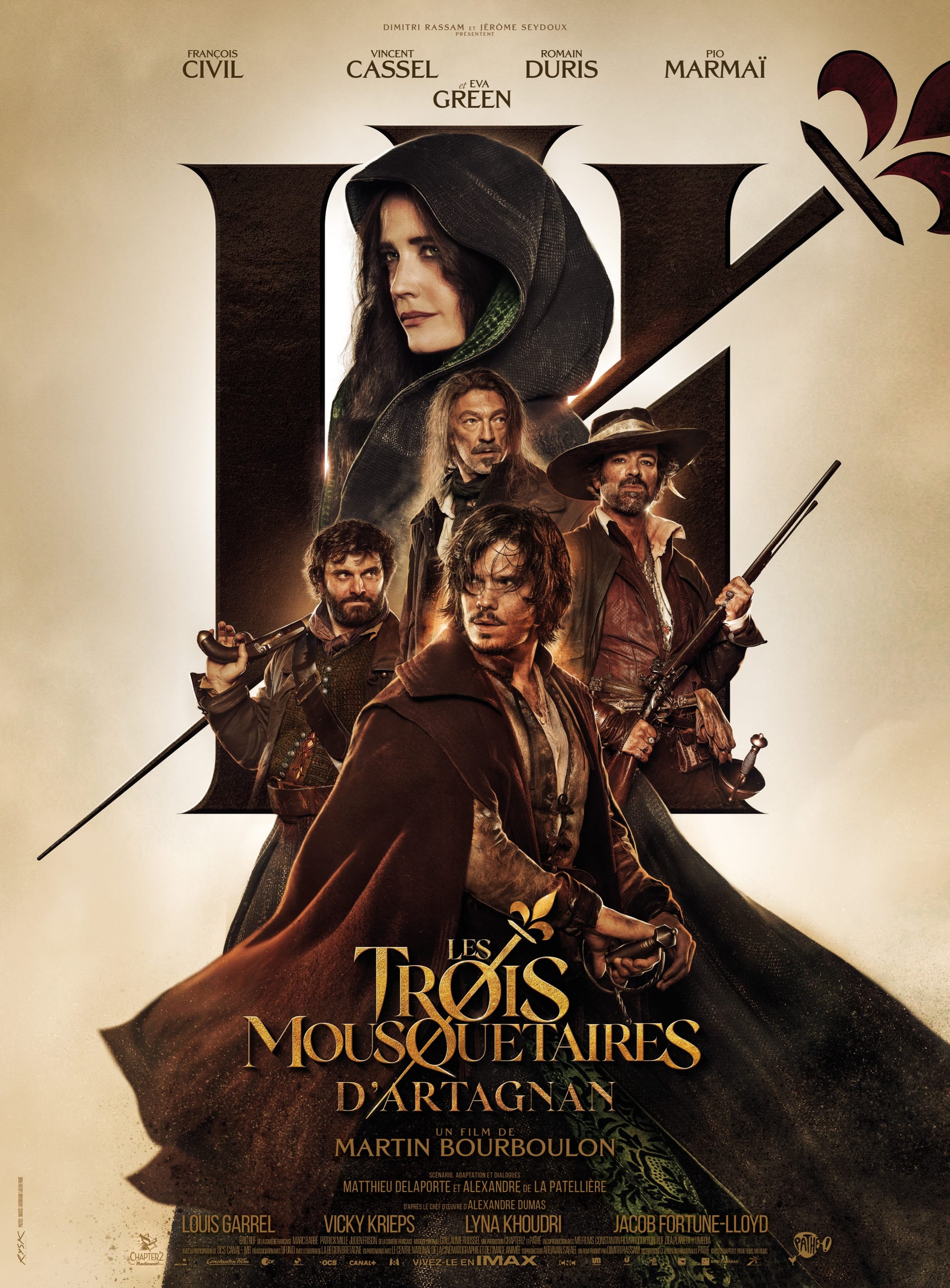
The classic tale of adventure begins anew, as young D'Artagnan journeys to Paris to join the storied King's Musketeers, and also to find the rogues who were responsible for attacking him on the road and leaving him for dead. Instead, he is thrust into the middle of a web of dastardly machinations that would not only see the King dead, but the whole of France plunged headlong into a war. Joining the famed three musketeers - Athos, Porthos and Aramis - D’Artagnan finds himself on an epic adventure to save the Crown and the entire Kingdom.
The Three Musketeers (Les Trois Mousquetaire) is a historical adventure novel of gallantry, heroism, and crossed swords, written by French author Alexandre Dumas, a man who, for reasons I can’t quite put my finger on, gives me the distinct impression that he is someone who knows how to party.
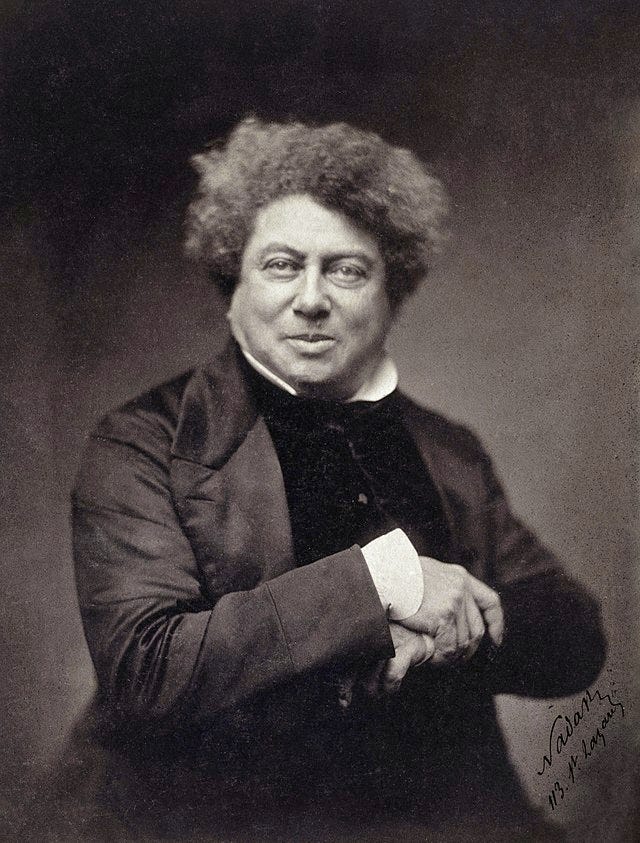
Look at that guy. Alexander Dumas fucked, man, I’m tellin’ ya…
Anyway, set sometime between the years 1625 and 1628, the book recounts the adventures of young d'Artagnan (based on Charles de Batz-Castelmore d'Artagnan, and played by the young Chris O’Donnell in the 1993 American film version) when he arrives in Paris to join the King’s Musketeers.
The historical Musketeers were a light cavalry unit in the Royal Guard, armed with musket and sword, that was open to the lower classes of French nobility, and due to the fact that many of them were teenagers, they became known for their fighting spirit and their unruly behavior.
Through a series of “first day” missteps, and quite a bit of youthful braggadocio, d’Artagnan ends up running afoul with, and ultimately befriending, the three most formidable musketeers of the age – Athos, older, melancholy, and carrying a dark past (based on Armand d’Athos, played by Keifer Sutherland in the 1993 film), Porthos, the wild hedonist (based on Isaac de Porthau, played by Oliver Pratt in the 1993 film), and Aramis, the lady’s man (based on Henri d’Aramitz, obviously played by Charlie Sheen in the 1993 film). Together, they are known as "The Three Musketeers" and as a result of these new friendships, d’Artagnan becomes embroiled in the diabolical dissembling that infests the affairs of Court between King Louie the XVIII and Cardinal Richelieu, all centered around efforts (backed by the English Crown) to push France into a war between the Catholics and the Protestants.
First published in serial form in the year 1844, about four years before the French Revolution, the book was known not just for its adventure, but for its portrayal of the various injustices, absurdities, and abuses of the Ancien Régime during a time that would prove to be one of significant political upheaval.
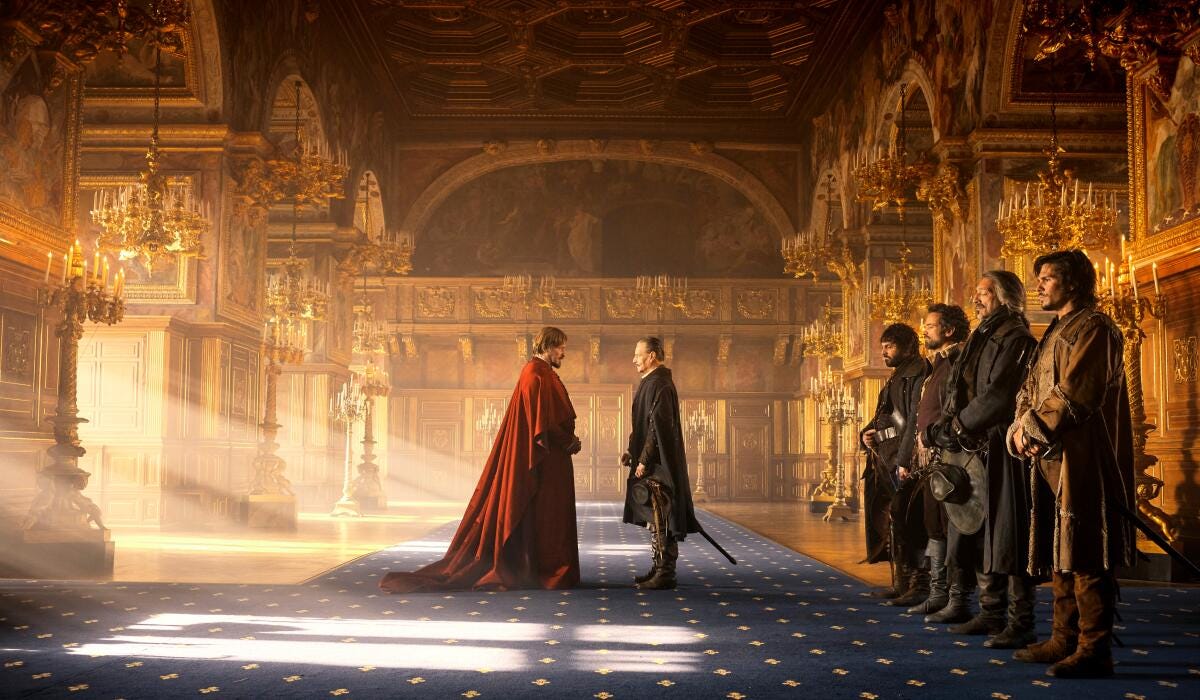
So…
It’s a time when men were men in pirate boots and wide-brimmed hats with jaunty feathers in the band, who often stood arms akimbo, while throwing their heads back to laugh “Ha HA!” before drawing their swords to declare “Have at thee!”
It’s a time when the sects of Christianity in France didn’t currently have a large number of foreigners to slaughter and colonize, so they were keeping themselves busy fighting each other.
It’s a time when just bumping into a guy on the street could end with you being slapped in the face by a finely-tooled glove made for a man, leading to a duel to the death somewhere in the nearby woods.
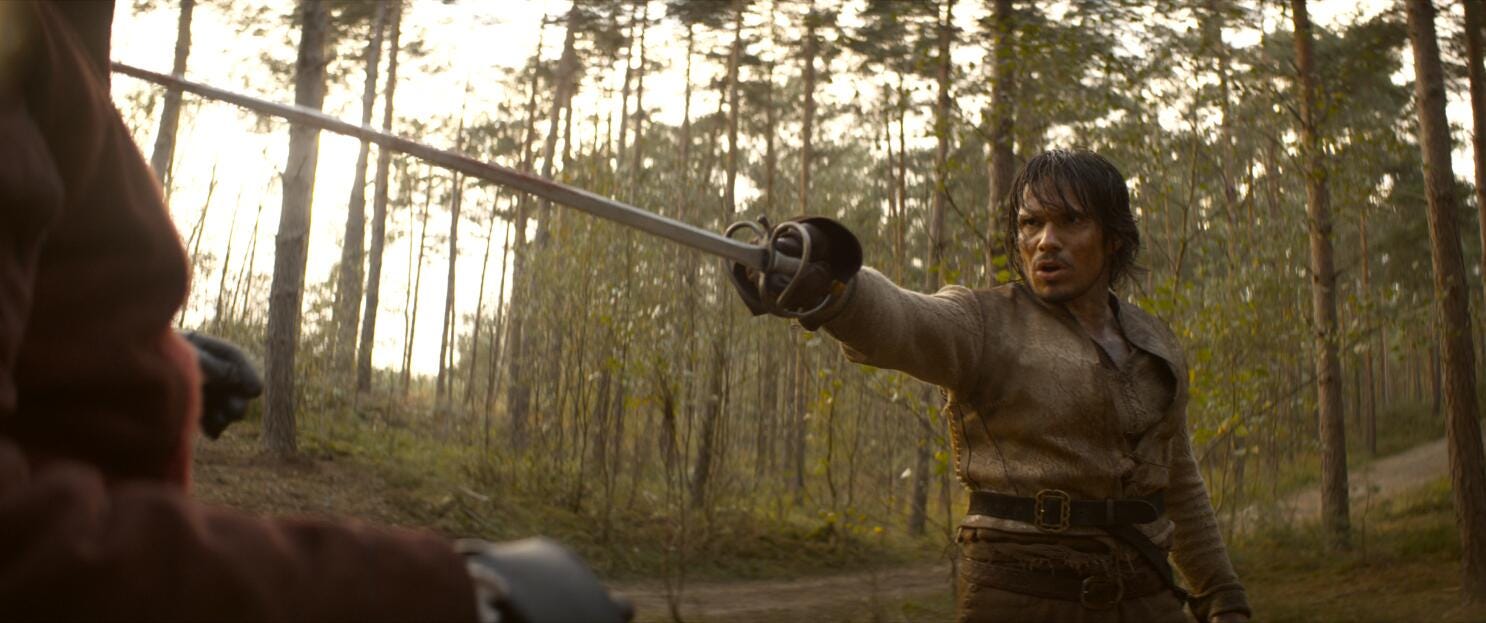
The first part of this all-star two-part big budget (for France) extravaganza, The Three Musketeers - Part One: D’Artagnan starts with the young swordsman trying to help a young woman who is being set upon by knaves and scoundrels, and ends up buried in an unmarked grave by a peg-legged man, and from there, it dives into a swirling storm of plots involving a diamond necklace that the unfaithful Queen Anne of Austria gifts to her lover, a dead countess that Athos is accused of killing, a royal wedding capped with an attempt on the life of the king, and a spy known as Milady De Winter, whose beauty is only rivaled by her deadliness...
And it all ends with a cliffhanger…
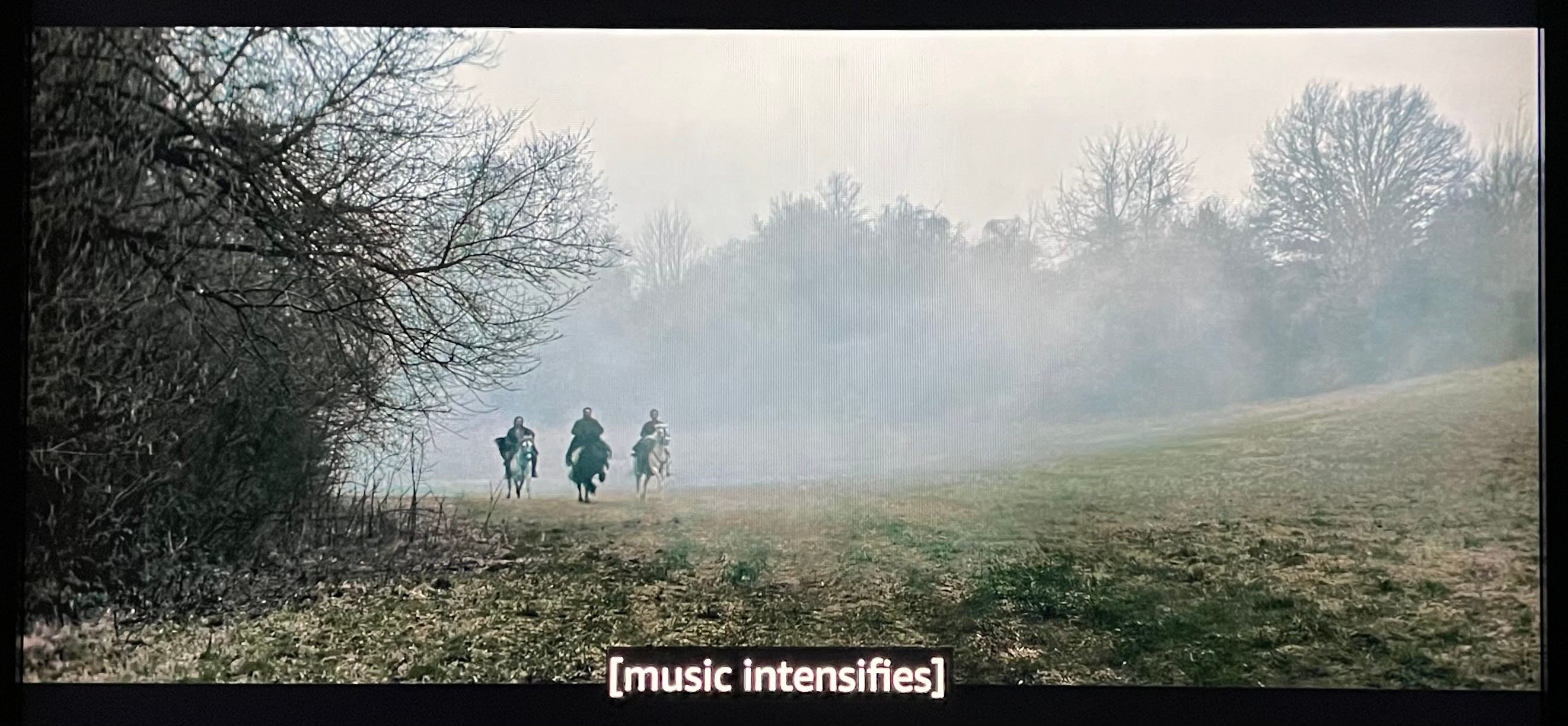
The cast are all great, especially our four heroes. Francois Civil plays D’Artagnan, Vincent Cassel is Athos, Romain Duris is Aramis, and Pio MarMai is Porthos, but it’s Eva Green who steals the show as Milady. She’s fantastic.
Portrayed in a style more evocative of Wild West Outlaws instead of the more traditional foppish dandies, the swordplay is fun, and the camera swoops all over the place. Story-wise, the film’s got all the intrigue, ambushes, brotherly camaraderie, and sudden sword fights you could want. The sound of swords scraping free of sheathes, and steel ringing on steel in stone courtyards, is practically its soundtrack.
But the palette is way, way too brown. Just brown. Nothing but brown. Light browns, dark browns, and all the browns in between. Apparently, everything was really dirty back in the early-to-mid 1600s, especially when it came to people’s faces—unless you were royalty, of course—and clearly, the last thing that this film wants any of us to do is forget that.
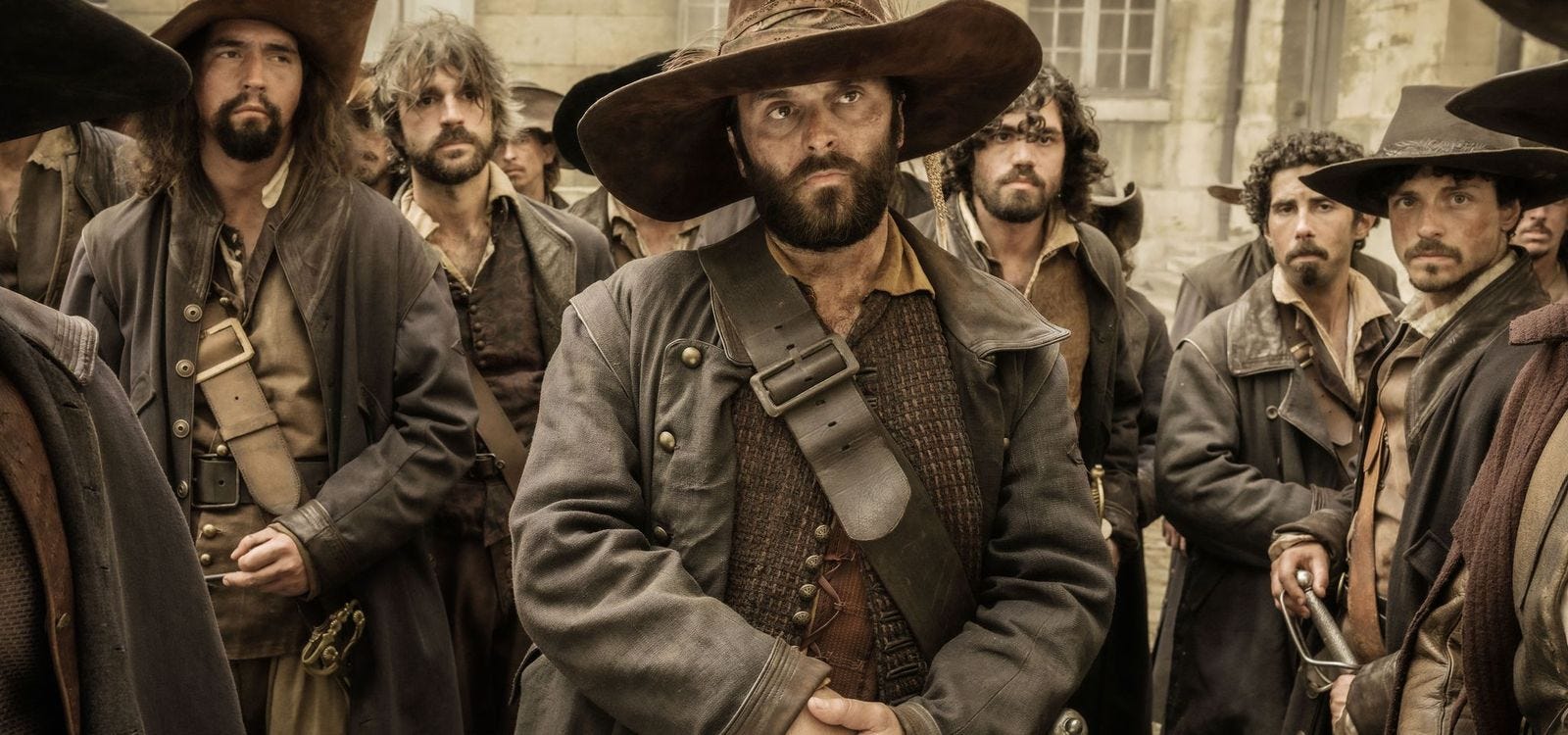
“It was the brownest of times, it was the beigest of times.”
I’d also say that maybe the film is a little more talky than you want. Yes, some of that talk involves the myriad secret plots and backroom deals, but it’s also a lot of maudlin lamentations from hairy, dirty men wearing fanciful rapiers and brooding over wine.
But to be fair, it IS the Three Musketeers, that kind of broad melodramatics is part and parcel with the story. Cutting out such lachrymose histrionics would be akin to asking an anime to cut out the part where the main character stands beneath falling cherry blossoms and tearfully recalls the time when they were elementary school best friends with the slim, long-haired bad guy who is trying to kill them.
The same goes for the absurdly broad comedic moments too. The first part of the movie involves an extended sequence where D’Artagnan meets each one of the three musketeers in turn, and through a bit of tomfoolery, ends up in a duel with each one of them, one at noon, one at one, and one at two. Whomp-whomp… I mean, but what are you gonna do? It’s a French mainstream movie, if there isn’t at least one variation of a person slipping on a banana peel and crashing into a cart of cakes, knocking it all everywhere... shit, it might as well be a German film. Besides, all that silly and exaggerated farcical bullshit is part of the book, so…
You kind of have to roll with it.
What’s harder to roll with is the way this film just ends. Reminiscent of the movie Superman Returns, where you realize as the credits start that the climax of the story just happened, the film just stops with a To Be Continued that feels so abrupt, it’s almost like they had a pre-set time limit, lost track of time, and then suddenly the lights went out, and they were like “Oh, shit… I guess that’s it.”
It’s never been a secret that there were going to be two parts to this story, so this was somewhat expected, but it still feels like they could’ve found a better way to craft this story into a proper two-parter so that the ending of the first film wouldn’t leave you feeling so frustrated and unsatisfied.
In the end, and on it’s own, this is a pretty decent version of the classic tale, but when it’s all said and done, and despite there being quite a bit of swordplay, it still felt like there was a bit too much jibber-jabber here, and not enough swashbuckling derring-do, like the main focus here was only introduction and set-up, and they were saving all the big time action for Part Two.
I guess we’ll see.
